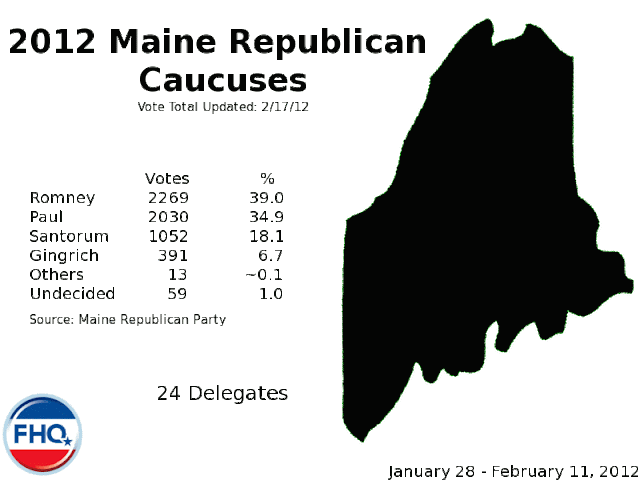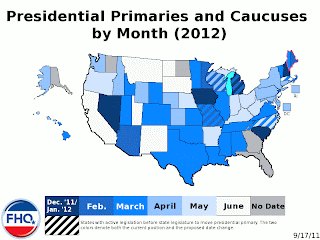The new requirement has been adopted in a number of different ways across the states. Some have moved to a conditional system where winner-take-all allocation is dependent upon one candidate receiving 50% or more of the vote and others have responded by making just the usually small sliver of a state's delegate apportionment from the national party -- at-large delegates -- proportional as mandated by the party. Those are just two examples. There are other variations in between that also allow state parties to comply with the rules. FHQ has long argued that the effect of this change would be to lengthen the process. However, the extent of the changes from four years ago is not as great as has been interpreted and points to the spacing of the 2012 primary calendar -- and how that interacts with the ongoing campaign -- being a much larger factor in the accumulation of delegates (Again, especially relative to the 2008 calendar).
For links to the other states' plans see the Republican Delegate Selection Plans by State section in the left sidebar under the calendar.
WASHINGTON
A few times in describing the delegate selection process in Republican caucus states FHQ has bemoaned the fact that often such an effort becomes an exercise in stating, "Just look back at Iowa." There is certainly some truth to that: a non-binding precinct-level caucus straw poll vote is taken with little or no discernible direct impact on the actual delegate selection process.
Wash, rinse, repeat.
So, yes, Washington Republicans on March 3 will hold precinct caucuses. And yes, the party will hold a non-binding presidential preference straw poll vote -- taken immediately when caucusgoers sign in at their caucus site -- that will have no direct bearing on the ultimate delegate selection process.2 In fact, having signed in and cast their straw poll vote immediately, caucusgoers will have the option of just turning right back around and heading home. They will also have the alternative option -- an option the party is urging caucusgoers toward -- of sticking around for the delegate selection vote that "actually counts".
This is where it is important what the party and its caucus volunteers do at caucus sites across the state on March 3. Will voters be urged by the party/volunteers to stick around for the delegate selection vote or will that be left unsaid and left up to the candidates organizations to ensure? That's a potentially important question. The difference is mainly in the fact that a prompt is more likely to lessen the sort of ballot roll-off witnessed in previous caucuses where people will vote in the "up-ballot" straw poll but drop out on the "down-ballot" delegate selection vote. With a prompt, Santorum and Gingrich supporters may be more likely to linger. Prompt-less, the advantage would have to go to Ron Paul and his supporters and the Romney folks to the extent they have and are organizing in Washington.
A few notes on the Washington caucuses:
1) This is an open caucus. There is no party registration in Washington, so independents and Democrats are free to participate.
2) Though FHQ has said it a number of times, there are few if any delegate allocation rules changes in the states prior to Super Tuesday relative to their rules in 2008. Nevada bound their delegates based on the precinct caucuses -- a change from 2008. Washington state has similarly had a slight change in its delegate allocation in 2012. In 2008, the party split the allocation across both a primary and a caucus. But because the Washington state legislature canceled the 2012 presidential primary in its session last year, the delegate allocation will be handled solely through the caucus in 2012. The impact is that overall participation will likely be down, though with the absence of the primary, caucus attendance may be up relative to four years ago.
3) It is unclear to FHQ -- but perhaps our Washington Republican readers can weigh in -- as to whether there is other party business to be conducted at the precinct caucuses other than the selection of delegates after the straw poll vote. The time commitment required of caucusgoers matters. Supporter attrition following straw poll votes is probably the most underreported rules-based aspect of this race currently.
Washington Republican delegate snapshot:
- 43 total delegates
- 10 at-large delegates selected by the state convention delegates based on their stated presidential preference at the state convention.
- 30 congressional district delegates selected by the district convention delegates based on their stated presidential preference at the district conventions.
- 3 automatic delegates who remain unbound regardless of the outcome of the precinct-level straw poll vote or the state/district convention votes.
1 FHQ would say 50 part, but that doesn't count the territories and Washington, DC.
2 Incidentally, I have never been a fan of the Washington State Republican Party website. It is awful from my perspective because there is nothing on there about rules or the party constitution. But credit where credit is due: The WSRP has a fabulous Tumblr site for the 2012 caucuses. I am particularly pleased with the this answer in their Q&A in the FAQ:
Is my vote going to be made public?There are two parts to the caucus. When you sign in, you will be asked to state your presidential preference - this will be considered your vote for the presidential straw poll. This vote will be a public vote in your caucus but it will not be made available to the general public. Then at the caucus you will undertake the important business of electing delegates. This is your vote that actually counts. The Straw poll is just a snapshot of who caucus attendees support, but the ultimate determiner of which candidates wins Washington’s delegates will be the delegates elected at the precincts caucuses. [emphasis FHQ's]
Recent Posts:
2012 Republican Delegate Allocation: Arizona
Missouri Republicans Will Caucus Both Before and After March 17
A Very Rough Estimate of the Republican Delegate Math Ahead, Part Two
Are you following FHQ on Twitter, Google+ and Facebook? Click on the links to join in.




